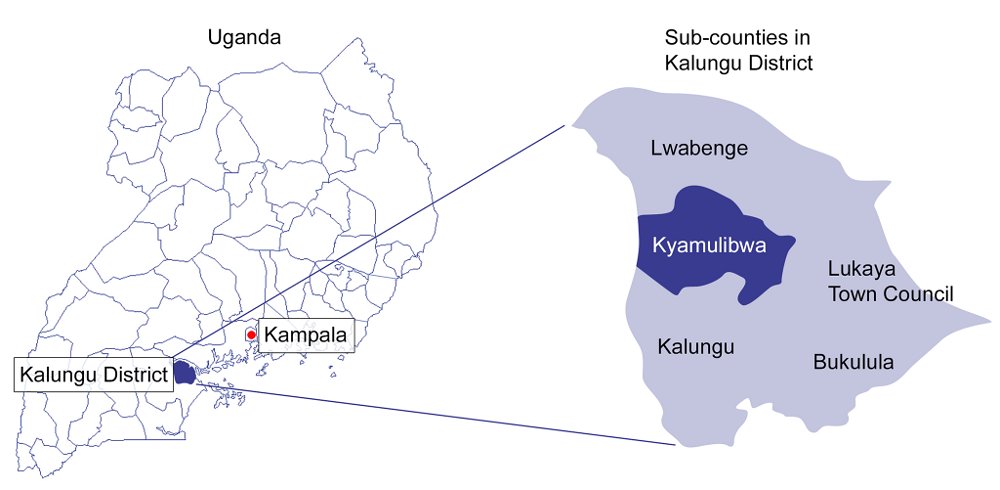Urban lifestyle risk factors increase in world's most rural area

“Our findings not only challenge the prevailing use of dichotomous urban-rural classification systems in epidemiological studies, but also indicate that even small-scale increases in urbanicity levels across rural environments are associated with a higher prevalence of unhealthy behaviours among rural residents.”
Johanna Riha First author from the University of Cambridge
Data collected in 2011 was used to examine associations between measures of urbanicity and lifestyle risk factors. The study included 7,340 participants aged 13 years and older living in 25 villages in rural Uganda. They found that levels of urbanicity varied markedly across the villages, ranging from those without educational facilities or electricity in households, to villages with a public telephone and a dispensary.
Despite the features of urbanisation being relatively modest, living in more urban villages was associated with increased risks of cardiometabolic disease risk factors such as physical inactivity, low fruit and vegetable consumption, and high body mass index, even after controlling for other factors such as socioeconomic status.
“Considering that over 533 million people live in rural areas across sub-Saharan Africa any increase in cardiometabolic risk associated with the development process in these areas is likely to have an impact on population health and healthcare services.”
Dr Manjinder Sandhu Senior author from the Wellcome Trust Sanger Institute and the University of Cambridge
While the number of underweight people currently exceeds the number of overweight people in Uganda, the increase of cardiometabolic diseases across sub-Saharan Africa is a cause for growing concern. By 2030 it is expected that 2.4 million deaths in sub-Saharan Africa will be due to cardiovascular disease and the prevalence of diabetes among adults between 20 and 79 is expected to increase to 4.6 per cent of the population. It is hoped that studies like this will inform early intervention strategies.
“A better understanding of these associations is crucial because modification of lifestyle risk factors through changes in the physical environment, including local infrastructure, may provide a potential avenue for primary prevention of cardiometabolic diseases in rural populations.”
Professor Janet Seeley Senior author from the Medical Research Council/Uganda Virus Research Institute Research Unit on AIDS in Uganda and the London School of Hygiene and Tropical Medicine
More information
Funding
Please see the paper for a full list of funding bodies.
Participating Centres
Please see the paper for a full list of participating centres.
Publications:
Selected websites
The Department of Public Health and Primary Care, University of Cambridge
The mission of the University of Cambridge is to contribute to society through the pursuit of education, learning and research at the highest international levels of excellence. To date, 90 affiliates of the University have won the Nobel Prize. Founded in 1209, the University comprises 31 autonomous Colleges, which admit undergraduates and provide small-group tuition, and 150 departments, faculties and institutions.
Cambridge is a global university. Its 19,000 student body includes 3,700 international students from 120 countries. Cambridge researchers collaborate with colleagues worldwide, and the University has established larger-scale partnerships in Asia, Africa and America. The University sits at the heart of one of the world’s largest technology clusters. The ‘Cambridge Phenomenon’ has created 1,500 hi-tech companies, 12 of them valued at over US$1 billion and two at over US$10 billion. Cambridge promotes the interface between academia and business, and has a global reputation for innovation.
The Medical Research Council/Uganda Virus Research Institute Uganda Research Unit on Aids
The Wellcome Trust Sanger Institute
The Wellcome Trust Sanger Institute is one of the world’s leading genome centres. Through its ability to conduct research at scale, it is able to engage in bold and long-term exploratory projects that are designed to influence and empower medical science globally. Institute research findings, generated through its own research programmes and through its leading role in international consortia, are being used to develop new diagnostics and treatments for human disease.
The Wellcome Trust
The Wellcome Trust is a global charitable foundation dedicated to achieving extraordinary improvements in human and animal health. We support the brightest minds in biomedical research and the medical humanities. Our breadth of support includes public engagement, education and the application of research to improve health. We are independent of both political and commercial interests.


